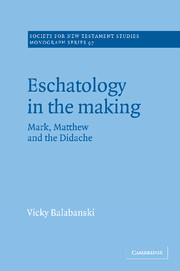Book contents
- Frontmatter
- Contents
- Preface
- List of abbreviations and note on texts
- Introduction
- 1 An imminent End? Models for understanding eschatological development in the first century
- 2 Matthew 25:1–13 as a window on eschatological change
- 3 Mark 13: eschatological expectation and the Jewish War
- 4 The Judean flight oracle (Mark 13:14ff) and the Pella flight tradition
- 5 Matthew 24: eschatological expectation after the Jewish War
- 6 Didache 16 as a development in Christian eschatology
- Conclusion
- Bibliography
- Index of modern authors
- Index of biblical and other ancient texts
- Subject index
3 - Mark 13: eschatological expectation and the Jewish War
Published online by Cambridge University Press: 04 September 2009
- Frontmatter
- Contents
- Preface
- List of abbreviations and note on texts
- Introduction
- 1 An imminent End? Models for understanding eschatological development in the first century
- 2 Matthew 25:1–13 as a window on eschatological change
- 3 Mark 13: eschatological expectation and the Jewish War
- 4 The Judean flight oracle (Mark 13:14ff) and the Pella flight tradition
- 5 Matthew 24: eschatological expectation after the Jewish War
- 6 Didache 16 as a development in Christian eschatology
- Conclusion
- Bibliography
- Index of modern authors
- Index of biblical and other ancient texts
- Subject index
Summary
In the history of New Testament interpretation in the last one hundred years, Mark 13 is one of the most carefully ploughed and reploughed fields. The farming implements have varied, the seasons have changed and the results have been correspondingly diverse. It has always seemed that if only the right methodology could be applied, the secrets of this chapter might be unlocked. There is at present an unprecedented variety of methodologies being applied to this material, ranging from the recent redaction-critical studies of J. Gnilka and R. Pesch, through the religio-historical analysis of E. Brandenburger, the socio-political analyses of H. C. Kee, W. Kelber, F. Belo, C. Myers and H. C. Waetjen, to the various literary approaches of N. R. Petersen, B. L. Mack, and M. A. Tolbert, to list only a few. Given such a variety of available approaches, it is crucial for this study that the methodologies applied and the order in which they are applied are both well-suited to the purpose of the study and self-critical.
The purpose of this study is to examine the expectation of an imminent End in Mark 13; how imminent is the End, where does the evangelist consider the Markan community to be within the plotted time of Mark 13, and is this in contrast to the expectation of the community for whom the evangelist is writing? These questions are historical, but they raise the narrative-critical question of the implied reader and the wider questions of socio-political context.
- Type
- Chapter
- Information
- Eschatology in the MakingMark, Matthew and the Didache, pp. 55 - 100Publisher: Cambridge University PressPrint publication year: 1997

